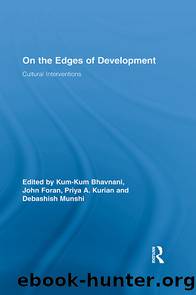On the Edges of Development by unknow

Author:unknow
Language: eng
Format: epub
Tags: Nonfiction, Social & Cultural Studies, Social Science, Human Geography, Sociology
ISBN: 9781135912888
Google: bykhxQEACAAJ
Publisher: Taylor and Francis
Published: 2009-03-04T05:00:00+00:00
SOCIAL AND CULTURAL ASSUMPTIONS
In this context, social and cultural assumptions concerning rural womenâs future acquire great relevance. In most poverty-alleviation programs, womenâs identities are based on the idea of what they are not and do not have.
Using an unrealistic model of âprogressiveâ and âfreeâ women as a point of comparison, their actions and personae are quickly associated with poverty, ignorance, illiteracy, low productivity, malnutrition, and underdevelopment. That is, they are lacking. They lack income, education, and access to resources. They also lack power and control over their lives. And, not only are they are deemed illiterate, but it is frequently deduced that they lack the necessary skills to help themselves. Most importantly, they lack a future. Lacking is the quintessence of their identity, the definition of their being.
Obviously these women do lack: they live in the midst of poverty, a number of their children are malnourished, and they have limited access to proper educational and health facilities. And it is important to stress such images in development practice, since they pump the passion of practitioners as well as donors. But the problem is that dearth is woven discursively into particular relations of power, subordination, and status.
The notion of âpoorâ condemns the bearer to a lesser status, a half person who needs to be âdeveloped:â to be educated, trained to acquire basic skills. What is needed is the intervention of âproviders,â who automatically bear a higher statusâwhere power and control are accessibleâand âexperts.â Experts are legitimately recognized as such by a salary; a title; physical distance (living, as they generally do, outside the site of intervention); symbolic distance, in terms of status, authority, and hierarchies; and social distance, which separates the âbeneficiariesâ from access to procedures, techniques, and the operation of markets.
The script concerning gender and poverty marks boundaries and excludes women, who are either idealistically depicted as living in the past (untainted by capitalism and thus needing to be âpreservedâ as part of Mexicoâs national heritage) or as lacking a future, a future that will be adequately constructed through development. Thus the invisibility of womenâso reiteratively denounced in academic textsâappears to be giving way to what could be an even more pernicious practice: the discursive production of a âwoman subject to developmentâ which has contributed to create new forms of subjection of women in the Third World (Mohanty 1991; Kabeer 1994; Escobar 1995; Parpart 1995; Viola 1999). Escobar (1995, 8â9) insists that it is important to âmake visible the power of the development apparatus to name women in ways that lead us to take for granted certain descriptions and solutions,â for in the very process of naming âhabitates the possibility of a colonialist effect.â
What is disturbing is that the victim role that is ascribed to women within the script does not change drastically within the âcounter-script,â where women âsubject to developmentâ must first recognize themselves as poor and powerless in order to subvert the system. They are vulnerable, invaded, penetrated by the development apparatus and capital. Global capital dictates the script within which women are already constituted as subjects.
Download
This site does not store any files on its server. We only index and link to content provided by other sites. Please contact the content providers to delete copyright contents if any and email us, we'll remove relevant links or contents immediately.
The Compound Effect by Darren Hardy(7563)
Tools of Titans by Timothy Ferriss(6952)
How to Be a Bawse: A Guide to Conquering Life by Lilly Singh(6694)
Deep Work by Cal Newport(5473)
Grit by Angela Duckworth(4739)
The Slight Edge by Jeff Olson(4722)
Discipline Equals Freedom by Jocko Willink(4638)
Wiseguy by Nicholas Pileggi(4588)
The Motivation Myth by Jeff Haden(4528)
Influence: The Psychology of Persuasion by Robert B. Cialdini(4181)
Year of Yes by Shonda Rhimes(4116)
The Four Tendencies by Gretchen Rubin(4024)
The Laws of Human Nature by Robert Greene(3950)
The Miracle Morning by Hal Elrod(3913)
The Confidence Code by Katty Kay(3569)
Eat That Frog! by Brian Tracy(3515)
Visual Intelligence by Amy E. Herman(3282)
Hyperfocus by Chris Bailey(3272)
Believe It to Achieve It by Brian Tracy & Christina Stein(3207)
